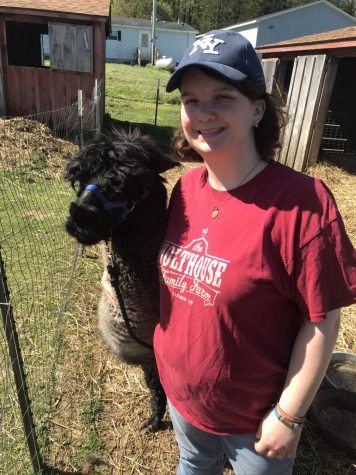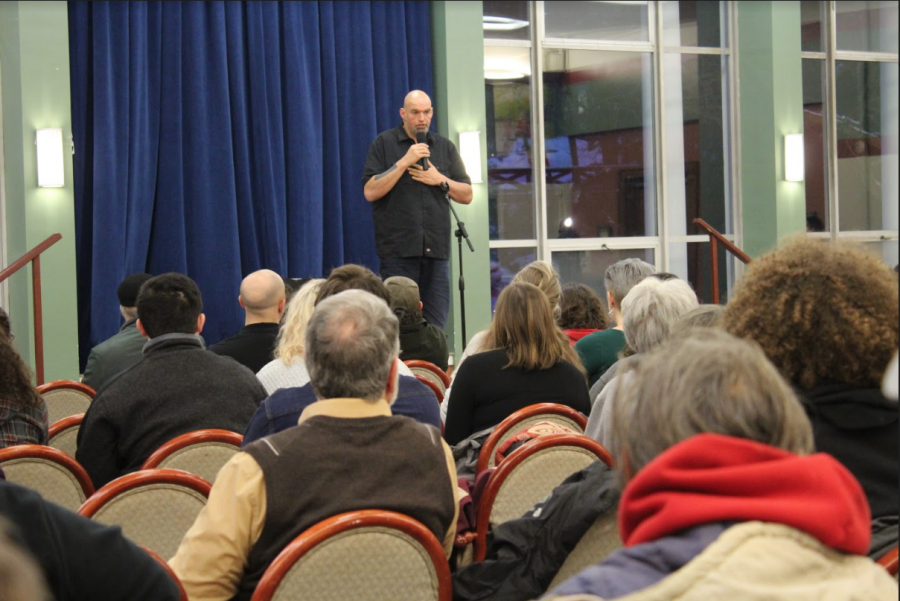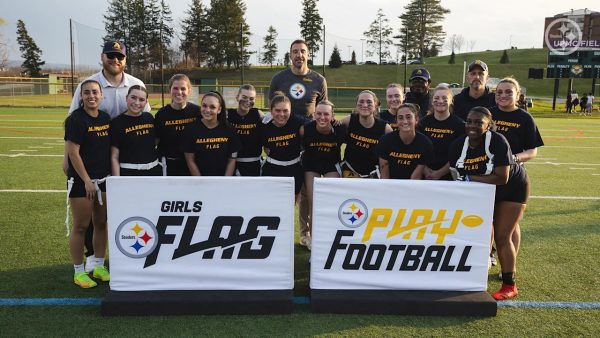Fetterman visits Allegheny to hear community opinions on the legalization of recreational marijuana
Lt. Gov. John Fetterman speaks to audience members about the legalization of marijuanna in Pennsylvania on a visit to campus. Fetterman spoke in Schultz Banquet Hall Wednesday, Feb. 27, 2019.
If a member of Crawford County has strong opinions about whether or not recreational marijuana should be legalized, Lt. Gov. John Fetterman is prepared to listen.
Fetterman came to campus as part of his Crawford County Recreational Marijuana Listening Tour from 6 to 7:30 p.m. Wednesday, Feb. 27, in Schultz Banquet Hall. Meadville and Allegheny community members were invited to attend although the audience contained many more townspeople than students of who around 15 were in the audience.
Fetterman began the event by welcoming everyone and asking the audience to remain civil and to listen to what those who spoke wanted to say.
“Let me just say what a complete and utter honor it is to be here, thank you,” Fetterman said. “This is my job; I have to be here, but you have a choice. You could be sitting at home eating dinner, watching Netflix — you know, in for the night. But you came out here to engage in an important matter like this, so thank you.”
Fetterman explained that this was his 11th or 12th stop on the listening tour and every location so far had been civil and open, expressing that everyone’s view was equally important.
“I would ask for no booing or jeering or making someone feel unsafe or uncomfortable voicing their opinion,” Fetterman said. “Every voice is equal. There’s no agenda except to hear what you in this room think.”
Attendees who wanted to express their opinions were allowed to step up to the two microphones on both sides of the room. Fetterman sat up front on the stage and listened.
Meadville residents and students alike explained their reasonings behind why they thought recreational marijuana should or should not be made legal in Pennsylvania.
“I’m rising today in strong support of legalizing marijuana,” said Quinn Broussard, ’22. “Firstly, many studies show that marijuana is clinically safer than tobacco and alcohol products, which are already legal in the Commonwealth of Pennsylvania. I feel that legalization is within our right as a commonwealth to regulate drug policy.”
As the lines of people formed behind each microphone, there was a mixture of people who were for and against the idea, with one man who declared himself neutral. One woman in attendance, Barbra Semen-Oaks, came from Jamestown, New York, and was strongly against legalizing marijuana because of the amount of young people dying due to opioid and marijuana use.
“I doubt that there isn’t a person in this room who hasn’t been touched by the opioid crisis in some way,” Semen-Oaks said. “When I pick up the paper and see a young man that my son went to school with has died of a drug overdose, that’s very sad to me. Legalization seems like a very bad idea to me. We can never legalize a vice because we want to make more money for the commonwealth.”
Common themes of the speakers included the idea of money and taxation that would be put on marijuana if it was legalized and the amount of medical problems that marijuana had fixed for many in the audience, or for their family members. Others claimed that those who said marijuana had helped to ease their pain were mixing up medical and recreational marijuana.
Both sides included stories of hardships, some created from people smoking marijuana, and others that some thought could have been prevented if they had legally been allowed to smoke marijuana. Craig Amos, a retired state trooper stood up and described his old job of preventing and apprehending impaired drivers under the influence of drugs, specifically marijuana.
“When you have to go and do a death notification, and you see the looks on those people’s faces when they realize that state trooper is standing at their door at three in the morning because someone they love is not coming home again, and you see the reaction that occurs, you know that is why I’m against the legalization of marijuana,” Amos said.
A woman in the crowd told her story of being one of those people who received a call like Amos described. Other stories included the death of friends and a woman who had her children taken away because she was caught smoking marijuana once and had no support from her family.
On the legalization side, a common problem that was raised was the discrimination against black men who end up in jail because of marijuana, while rich white men often get away with no jail time after being caught.
“I do admit I don’t know much about economics, and I don’t fully know what will happen if we legalize marijuana,” Peyton Britt, ’22, said. “I do know there are white places in Los Angeles that will pay you $100 an hour to smoke weed and do some yoga, while there are black men out there who are in jail and serving time for a dime bag.”
As the event came to a close, some in the room spoke on how the legalization of marijuana is a bigger issue than they realized before they came.
“When I came in and filled out the comment card, I circled that I was for the legalization of marijuana,” Mark Myers, ’19, said. “I’m still kind of for that, but I kind of thought that this was a lot more cut and dry than it’s turned out to be. The stories that I’ve heard tonight made me tear up a bit, and I was not expecting that, to be honest.”
Myers told the audience his own personal story where his friend got high on marijuana after a practice and died after crashing on his drive home.
“And I can’t say that he would want me to get up here and say that marijuana is an evil thing because I don’t believe he would think that,” Myers said. “I guess these things just came to my head while I was sitting here.”
One person in the room said she thought it was sad youth these days seem to need drugs to have fun, and that was not happening when they were younger. Others said this was because of the generation gap and what students these days have to deal with.
“Some of the anecdotal evidence I’ve heard on this has been really moving, so I just wanted to counter with some anecdotal evidence of my own,” Dominic Bell, ’20, said. “There was a quote earlier, that I’m not going to argue with because (everyone) has the right to their opinion, but I think it was ‘I think it’s sad that young people just can’t have fun anymore.’ … We’re the most stressed, overworked, underpaid generation of all time, and so the idea of us having fun just doesn’t really exist. But I think it’s a credit and not a shame to you and your administration that you’re going around and talking about this, because it is the will of the people.”
After people had the chance to speak their minds, Fetterman called for people to raise their hands to show whether they were for, against, or in the middle, on whether marijuana should be legal. More members in the crowd raised their hands for legalization than against, and only two or three were undecided. After seeing and hearing the last few thoughts, Fetterman thanked everyone for coming again, and for giving up their time to be heard.

Sara Holthouse is a senior from Panama, NY. This is her third year/final semester on staff, where she has previously served as news editor for the past...









